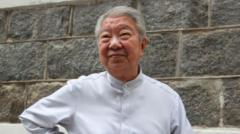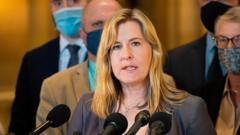Innes Tang, a former banker, claims to have reported numerous individuals for supposed national security breaches in Hong Kong, sparking debates on the implications of the national security law and its impact on civil liberties in the city.
Pro-China Informant In Hong Kong: "My Role in Reporting National Security Violations"

Pro-China Informant In Hong Kong: "My Role in Reporting National Security Violations"
Innes Tang, a self-proclaimed patriot, discusses his motivations for reporting dozens of Hongkongers to the police under the national security law.
Innes Tang has taken a proactive stance in what he perceives as the safeguarding of national security in Hong Kong, initiating a hotline funded by himself to collect tip-offs on activities he believes violate the national security law (NSL). His motivations stem from a love for Hong Kong, he asserts, though his actions have been met with criticism and raised concerns regarding the erosion of free speech and civil rights in the region.
From an individual waving a colonial-era flag in a mall to bakery employees presenting cakes adorned with protest symbols, Tang has reported a range of incidents to the police, claiming to protect the community's interests. Since the NSL was enacted, he asserts that his reports have led to numerous police investigations, some culminating in jail sentences.
The NSL, established following the city's pro-democracy protests in 2019, has drawn accusations of suppressing dissent and fostering an environment of fear, with a reported 300 people prosecuted under its provisions. Although Tang frames his reporting as community collaboration with law enforcement, critics argue that this practice has sparked a culture of mutual surveillance, where citizens report fellow residents out of fear or opportunism.
The government of Hong Kong has established a separate security hotline, receiving hundreds of thousands of tip-offs in recent years, which highlights the extent of civic surveillance. Observers note that this atmosphere discourages open dialogue, contributing to a significant brain drain as many residents flee the tightening political landscape.
Tang himself identifies as a voice for the "silent majority" who do not support independence from China, claiming that while he once yearned for greater unity with China during colonial times, his views evolved after witnessing the protests of 2019. He has expressed concern over the potential misuse of the NSL, cautioning against its weaponization for political vendettas.
Academic and political figures in Hong Kong have voiced frustrations regarding the repercussions of this security legislation, emphasizing a pervasive climate of self-censorship and a diminished capacity for public discourse. Many now grapple with the reality of a political landscape drastically transformed, where pro-democracy voices have been sidelined and activism quelled.
As Tang shifts his focus to an international stage, working with pro-Beijing organizations and engaging with global institutions like the UN, he underscores his mission to advocate for his views outside of Hong Kong. However, figures like political scientist Kenneth Chan reflect on a stark reality: friends and colleagues are either imprisoned, in exile, or grappling with the unpredictable nuances of life under the NSL.
For Tang, the lull in major protests signals a return to "balance" in Hong Kong's societal order, yet skepticism abounds as many residents question the long-term implications of watching and reporting under the watchful eye of the law. The Hong Kong government's assertion that the NSL primarily targets a minority for the public's safety does little to assuage fears among those who value the city's storied history of democratic expression and civic engagement.
From an individual waving a colonial-era flag in a mall to bakery employees presenting cakes adorned with protest symbols, Tang has reported a range of incidents to the police, claiming to protect the community's interests. Since the NSL was enacted, he asserts that his reports have led to numerous police investigations, some culminating in jail sentences.
The NSL, established following the city's pro-democracy protests in 2019, has drawn accusations of suppressing dissent and fostering an environment of fear, with a reported 300 people prosecuted under its provisions. Although Tang frames his reporting as community collaboration with law enforcement, critics argue that this practice has sparked a culture of mutual surveillance, where citizens report fellow residents out of fear or opportunism.
The government of Hong Kong has established a separate security hotline, receiving hundreds of thousands of tip-offs in recent years, which highlights the extent of civic surveillance. Observers note that this atmosphere discourages open dialogue, contributing to a significant brain drain as many residents flee the tightening political landscape.
Tang himself identifies as a voice for the "silent majority" who do not support independence from China, claiming that while he once yearned for greater unity with China during colonial times, his views evolved after witnessing the protests of 2019. He has expressed concern over the potential misuse of the NSL, cautioning against its weaponization for political vendettas.
Academic and political figures in Hong Kong have voiced frustrations regarding the repercussions of this security legislation, emphasizing a pervasive climate of self-censorship and a diminished capacity for public discourse. Many now grapple with the reality of a political landscape drastically transformed, where pro-democracy voices have been sidelined and activism quelled.
As Tang shifts his focus to an international stage, working with pro-Beijing organizations and engaging with global institutions like the UN, he underscores his mission to advocate for his views outside of Hong Kong. However, figures like political scientist Kenneth Chan reflect on a stark reality: friends and colleagues are either imprisoned, in exile, or grappling with the unpredictable nuances of life under the NSL.
For Tang, the lull in major protests signals a return to "balance" in Hong Kong's societal order, yet skepticism abounds as many residents question the long-term implications of watching and reporting under the watchful eye of the law. The Hong Kong government's assertion that the NSL primarily targets a minority for the public's safety does little to assuage fears among those who value the city's storied history of democratic expression and civic engagement.





















